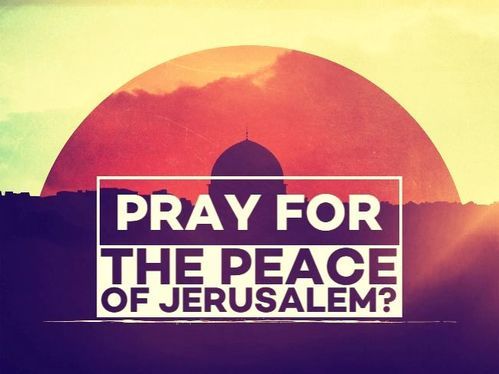Pray for the Peace of Jerusalem?

Dear CBC Family,
I was having dinner with the elders last night and as we were talking one of the men said they were asked about the concept of “praying for the peace of Jerusalem” from Ps 122. We ended up having a great discussion on it and I thought I’d send you a couple of thoughts to consider.
Remember that context determines both interpretation and application. Psalm 122 is a “Psalm of Ascent” written by David to be sung as the Jewish people were coming to Jerusalem to celebrate one of the three required feasts (Passover, Pentecost and Tabernacles) that they had to attend yearly. This psalm begins with “I was glad when they said to me let us go to the house of the Lord” and so we understand this was the call to get ready for their pilgrimage to the holy city. Verses 3 & 4 highlight the rationale for the people’s journey; “Jerusalem—built as a city that is bound firmly together, to which the tribes go up, the tribes of the Lord, as was decreed for Israel, to give thanks to the name of the Lord.” During these festivals hundreds of thousands came to worship and offer sacrifices to the Lord. No one was to appear “empty handed” Dt 16:16. The “prayer” for Jerusalem and its peace is, in context, peace for the times of these feasts with such massive crowds. David continues in V6-9 “Pray for the peace of Jerusalem! May they be secure who love you! Peace be within your walls and security within your towers! For my brothers and companions’ sake I will say, “Peace be within you!” For the sake of the house of the Lord our God, I will seek your good.” David is praying for the pilgrim’s and resident’s “safety and security” for “my brothers and companions”. He asks for the entire city to be at peace “for the sake of the house of the Lord” he seeks the entire city’s peace. He does not want the feasts to be tainted by unrest, crime or violence. Jerusalem means the city of peace and he wants everyone to experience that as they come to worship. “Peace be upon Israel” was a very common farewell blessing from these gatherings that is even recorded in Ps 125:5 and Ps 128:6.
Psalm 122 is NOT a command for modern day believers to follow in some sort of superstitious way. This idea is not repeated in the New Testament at all and only applied to the Jews during their times of pilgrimage. The equivalent would be if there was a large gathering of believers to pray together in Los Angeles we would pray for the peace of Los Angeles for that event.
Jesus said that we should be peacemakers, which would include praying for peace, not just for Jerusalem but all cities. Matt 5:9 “Blessed are the peacemakers, for they shall be called sons of God.” We are also commanded to do our best to live at peace with others. Ro 12:18 “If possible, so far as it depends on you, be at peace with all men.” So, God wants us to seek peace among all people, and pray for peace for all nations, and preach the gospel of peace to all men. The prayers of peace must begin with a peace between them and their Maker not just an absence of hostilities between them and their neighbors. The second is the fruit of the first.
One very important thing to keep in mind about the “peace of Jerusalem” is that it was Jesus Himself who destroyed Jerusalem and the temple in 70 AD and since that time there is “no difference between Jew or Greek.” Gal 3:28. All that matters is whether or not one is in Christ and, if they are that group, regardless of ethnicity, are Abraham’s descendants and the chosen people of God. (Romans 2 and 4, Gal 3:29). The constant attempt to erect the dividing wall Jesus tore down (Eph 2) is most unfortunate and fuels pride and disunity that Jesus died to destroy.
There is nothing wrong with praying for the peace of Jerusalem, unless it is done under the superstition that there is a reward for doing so. I pray for the salvation of the people who call themselves Jews as well as the Muslim and all the nations that will never be at peace until they submit themselves to the Prince of Peace Jesus Christ. I look forward to a new Jerusalem where all the redeemed from every nation, tribe and tongue will forever dwell and see our great God and King face to face. I get a little glimpse of that every Sunday when we gather at church which is why I often sing Ps 122 verse one on my way in “I was glad when they said to me let us go to the house of the Lord”!
This weekend we are back in Romans, what’s new right? I look forward to seeing you all for a great time around His Word. Life is hard but the encouragement and love we share together is a means of His grace to see us through. Don’t forsake this tremendous means of grace to you and your family (Heb 10:25)
Blessings be upon all who love our Lord Jesus,
Pastor Scott
I was having dinner with the elders last night and as we were talking one of the men said they were asked about the concept of “praying for the peace of Jerusalem” from Ps 122. We ended up having a great discussion on it and I thought I’d send you a couple of thoughts to consider.
Remember that context determines both interpretation and application. Psalm 122 is a “Psalm of Ascent” written by David to be sung as the Jewish people were coming to Jerusalem to celebrate one of the three required feasts (Passover, Pentecost and Tabernacles) that they had to attend yearly. This psalm begins with “I was glad when they said to me let us go to the house of the Lord” and so we understand this was the call to get ready for their pilgrimage to the holy city. Verses 3 & 4 highlight the rationale for the people’s journey; “Jerusalem—built as a city that is bound firmly together, to which the tribes go up, the tribes of the Lord, as was decreed for Israel, to give thanks to the name of the Lord.” During these festivals hundreds of thousands came to worship and offer sacrifices to the Lord. No one was to appear “empty handed” Dt 16:16. The “prayer” for Jerusalem and its peace is, in context, peace for the times of these feasts with such massive crowds. David continues in V6-9 “Pray for the peace of Jerusalem! May they be secure who love you! Peace be within your walls and security within your towers! For my brothers and companions’ sake I will say, “Peace be within you!” For the sake of the house of the Lord our God, I will seek your good.” David is praying for the pilgrim’s and resident’s “safety and security” for “my brothers and companions”. He asks for the entire city to be at peace “for the sake of the house of the Lord” he seeks the entire city’s peace. He does not want the feasts to be tainted by unrest, crime or violence. Jerusalem means the city of peace and he wants everyone to experience that as they come to worship. “Peace be upon Israel” was a very common farewell blessing from these gatherings that is even recorded in Ps 125:5 and Ps 128:6.
Psalm 122 is NOT a command for modern day believers to follow in some sort of superstitious way. This idea is not repeated in the New Testament at all and only applied to the Jews during their times of pilgrimage. The equivalent would be if there was a large gathering of believers to pray together in Los Angeles we would pray for the peace of Los Angeles for that event.
Jesus said that we should be peacemakers, which would include praying for peace, not just for Jerusalem but all cities. Matt 5:9 “Blessed are the peacemakers, for they shall be called sons of God.” We are also commanded to do our best to live at peace with others. Ro 12:18 “If possible, so far as it depends on you, be at peace with all men.” So, God wants us to seek peace among all people, and pray for peace for all nations, and preach the gospel of peace to all men. The prayers of peace must begin with a peace between them and their Maker not just an absence of hostilities between them and their neighbors. The second is the fruit of the first.
One very important thing to keep in mind about the “peace of Jerusalem” is that it was Jesus Himself who destroyed Jerusalem and the temple in 70 AD and since that time there is “no difference between Jew or Greek.” Gal 3:28. All that matters is whether or not one is in Christ and, if they are that group, regardless of ethnicity, are Abraham’s descendants and the chosen people of God. (Romans 2 and 4, Gal 3:29). The constant attempt to erect the dividing wall Jesus tore down (Eph 2) is most unfortunate and fuels pride and disunity that Jesus died to destroy.
There is nothing wrong with praying for the peace of Jerusalem, unless it is done under the superstition that there is a reward for doing so. I pray for the salvation of the people who call themselves Jews as well as the Muslim and all the nations that will never be at peace until they submit themselves to the Prince of Peace Jesus Christ. I look forward to a new Jerusalem where all the redeemed from every nation, tribe and tongue will forever dwell and see our great God and King face to face. I get a little glimpse of that every Sunday when we gather at church which is why I often sing Ps 122 verse one on my way in “I was glad when they said to me let us go to the house of the Lord”!
This weekend we are back in Romans, what’s new right? I look forward to seeing you all for a great time around His Word. Life is hard but the encouragement and love we share together is a means of His grace to see us through. Don’t forsake this tremendous means of grace to you and your family (Heb 10:25)
Blessings be upon all who love our Lord Jesus,
Pastor Scott
Recent
Archive
2026
January
2025
January
March
2024
August
October
December
2023
January
February
December
2022
January
August
Categories
no categories
